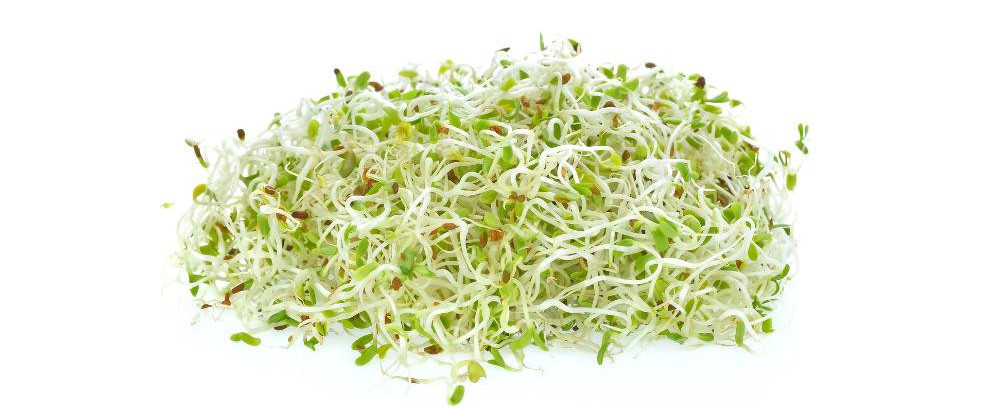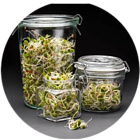I may not be the best person to talk about the health benefits of alfalfa sprouts, since I don’t eat them as frequently as I probably could or should. Part of the reason for this is that I drive a truck, and it’s not so easy or convenient to get fresh vegetables when I’m on the road. I usually use powdered greens from a can!
But I do like sprouts – and they are very healthy and budget-friendly, as we will see – if eaten properly, as I have noted below.
Is There Something Special About Alfalfa?
It does seem that there is. Alfalfa is probably best known as cattle feed – but there’s no doubt a reason for that! Farmers want their cows to be well-nourished, so they can produce the best milk and beef. For cattle, it generally comes in the form of alfalfa hay.
For people, not so much! In the human realm, it’s generally consumed either as a herb – possibly in tablet form – or as sprouts.
So what’s in alfalfa that makes it such a great addition to one’s diet?
Alfalfa contains a relatively high concentration of Vitamin K – the well-known blood-clotting vitamin. Vitamin K is very healthy, we need it – although those who are on blood thinners or have issues with blood clots may need to limit their Vitamin K intake.
Alfalfa also contains Vitamin C, folate, thiamine, riboflavin, magnesium, iron, and copper. The amounts are not high, but one of the unsung values of eating whole foods as nearly as possible to the way they were created is that you get the balance between nutrients that your body benefits from in ways that are not always so easily defined by research and studies.
There have been studies – albeit on animals – that show that alfalfa has strong antioxidant value to the body. It lowers the production of free radicals and helps the body fight them.
Vitamin K is essential in helping to prevent – and possibly even treat – osteoporosis. It is a bone-strengthener! Thus it helps to prevent fractures as well. Since alfalfa is high in Vitamin K, it could be one of the tools you use to help keep your skeletal system strong.
One of the most well-studied positive effects of alfalfa has been its ability to lower LDL cholesterol – and thus reduce the risk of heart disease. This is due to alfalfa’s saponin content – plant compounds that lower cholesterol.
A study has found that alfalfa sprouts have the ability to lower blood glucose levels, and are thus anti-diabetic in their effect on the body.
Alfalfa is high in phytoestrogens – or “plant estrogens.” They may have the benefit of being able to ease menopausal symptoms such as hot flashes.
Why Sprouts?
Sprouting any seed tends to release the nutrient value that lies in the seed, and give it more bioavailability in the body. Alfalfa is no exception!
In addition to being a great source of nutrients, the fact that alfalfa sprouts contain only eight – I repeat, eight – calories per cup – I repeat, cup! – makes them great as a temporary stomach filler if you are on a weight-loss regimen. That means that you could eat 150 cups of alfalfa sprouts per day and still only get 1200 calories! I’m not recommending that – but you get the point!
Alfalfa sprouts contain chlorophyll – which has many health properties in its own right, like potential anti-cancer, anti-aging, blood-building, wound-healing, toxin-neutralizing, and inflammation-reducing properties.
How to Eat Alfalfa Sprouts
You can of course just grab and eat them by the handful, they don’t taste bad at all. Kinda refreshing, actually!
One of the best ways to eat alfalfa sprouts is in sandwiches. It’s an easy way to add some healthy greens to your sandwich – and some crunch as well.
Alfalfa sprouts can for sure be added to salads! They are a great, crunchy addition that will add eating pleasure to almost any salad.
Use alfalfa sprouts in stir-fries! They have a mild nutty flavor and will complement the flavors of the meat in your stir-fry. Add them close to the end of the stir-frying process though so they don’t become excessively soft or disintegrate.
A Warning
There have been instances in which raw sprouts have become contaminated and can cause food poisoning and salmonella or E-coli outbreaks. This is because they are grown in warm and humid conditions which can also cause the growth of bacteria.
How can you prevent this? The “official” recommendation is to wash your sprouts in water before use to get rid of contaminants. In other words, best not to just eat them out of the box! Or create a very-diluted bleach solution to wash them. This doesn’t only apply to sprouts, it also applies to other fruits and vegetables.
Of course, cooking the sprouts – as in stir-fries as mentioned above – will generally kill bacteria as well, so if you are immune-compromised, especially, this may be a good route for you to still get the health benefits of alfalfa sprouts without the risk of contamination.
Grow Your Own
You can grow your own sprouts! Just a note, though, that this will not completely eliminate the possibility of contamination, you still need to follow the recommendations above. But there are cool sprouting kits available for just a few dollars that you can use to make your own! So if you want to grow some of your own food, and maybe don’t have space for a garden, this is a cool idea! Check out this kit, for example.
Finally…
As long as you take the necessary precautions to prevent contamination, alfalfa sprouts are an amazing health food that can add a healthy crunch to your diet, no matter how you choose to use them.
If you have additional comments or questions related to the content of this post, please feel free to share in the space provided below!



Hi Daniel,
I found your article in sprouts very interesting and informative. I have been eating sprouts since my early twenties. I am now in my mid-sixties. I have always known sprouts were good for you. It was one of the original hippie foods but I didn’t know it reduces cholesterol. One of my favourite foods is sprouts on a cheese and tomatoes sandwich.
Cheers John
Wow, that’s a great sprout history! They are delicious, for sure! Cheese, tomato and sprouts…I’ll have to try that sometime!